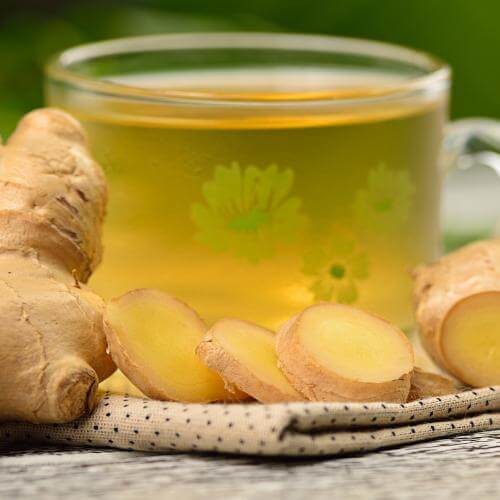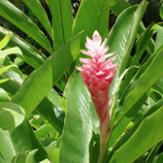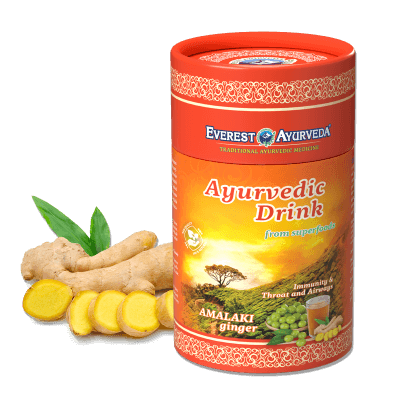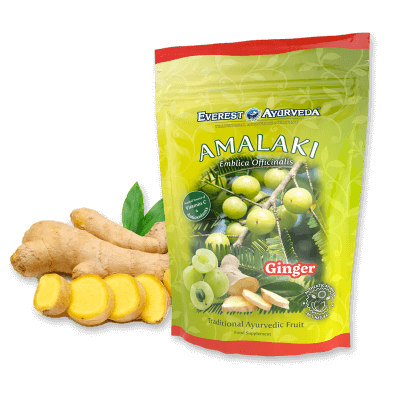
Ginger tea. This is exactly what each of us has experienced several times in our lives with the belief that it will drive away the colds or the initial signs that we are "catching something". Find out how it is used Ayurveda!
From Ayurvedic point of view, ginger is considered one of the most valuable and most widely used herbs and its healing effects have been known for many centuries. Therefore, in the following lines, we offer an Ayurvedic insight into the secrets of the effects of this extraordinary herb.
Ginger, in Latin Zingiber officinale, Ayurvedic "Shunthi" is a perennial plant growing up to 1.5 m, mainly in China, India and Nepal. The most used part is the aboveground rhizome, sometimes incorrectly referred to as the root.

In Ayurveda, ginger is used as a medicine and sattvic spice in both fresh (adrak) and dried (shunthi) form. It is suitably suitable for all three dosic constitutions of vata, pitta and kapha. It is also an important part of many Ayurvedic medicines because it supports and enhances the healing effects of other herbs and ingredients.
What Are the Main Health Effects of Ginger?
First, it harmonizes the digestive system for indigestion and nausea. Ginger significantly increases the digestive fire (agni) and thus stimulates the appetite, generally supports the process of digestion and detoxification and thus reduces bloating.
Ginger also has a very strong, anti-inflammatory and antibacterial effect. It purifies the blood, stimulates the heart and circulatory system. Helps with jaundice, arthritis, hemorrhoids, swelling and hives. It is an excellent remedy for diseases caused by an excess of vata dosha.
In addition, it stimulates the nervous system, increases the transmission of nerve impulses and relieves pain. Due to its bitterness (tikta) and oiliness (snigdha), it helps with asthma and respiratory problems. It also acts as an aphrodisiac.
In terms of the Ayurvedic properties of food, which in the normal diet affect the balance of our dosha constitution, ginger is hot, sweet, dry, spicy, oily and heavy. It thus reduces vata and kapha and increases pitta if taken in larger amount.
Dried ginger naturally has a greater dryness, but also greater bitterness than fresh, ie it heats up the body more significantly, and is therefore more suitable for the constitution of kapha, when it alleviates its cold and moist nature. Fresh is then more suitable for vata and pitta. Due to its warming effects, it is not recommended for inflammatory diseases, ulcers and high fever.
Try Ginger in Ayurvedic Way!
Undoubtedly, the most popular way to use ginger is to make tea from fresh rhizome and add honey. To really alleviate a cold, it needs to be cooked for at least 5-10 minutes. You can also eat the very pieces of fresh ginger, which help with hoarseness or relieve sore throat, and salted fresh ginger stimulates the appetite and supports digestion.
Thanks to its beneficial effects, ginger also has an irreplaceable place among our Ayurvedic supplements. In Ayurvedic Himalayan teas alone, ginger is found in about half of herbal blends, known in Ayurveda as "kvathas" (herbal decoctions). We also use ginger extensively in the recipes of our nutritional and cleansing elixirs known as "avalehas".
But the strongest taste of ginger you can enjoy in the hot Ayurvedic drink AMLA & GINGER, which you prepare by pouring warm water over finely ground powder of Ayurvedic amla fruit and ginger and adding honey to your liking. The way you drink finely ground healthy herbs along with warm liquid is called "churna" in Ayurveda. The combination of amla with ginger will warm you up pleasantly and at the same time strongly support the immune system. You will also find it among our Ayurvedic Immunity Sets.
For lovers of dried fruit, ginger can be tried in the form of dried amla wrapped in freshly ground ginger.

 100 g
100 g  100 g
100 g